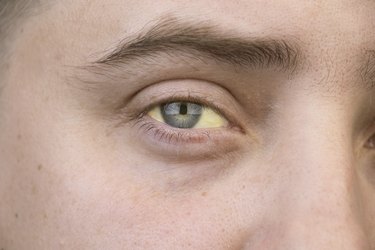
If you suddenly have yellow hands, chances are that this has been caused by one of two conditions that can cause your skin, including the skin on your hands, to turn yellow — jaundice, which can be dangerous, or carotenaemia, which usually isn't.
Read more: The Best Diet for Liver Disease and Diabetes
Video of the Day
Video of the Day
All About Jaundice
Jaundice is a condition characterized by yellow skin, eyes and mucous membranes, according to the Cleveland Clinic.
"This disease is often seen in newborn babies; however, adults can develop it too," says Michele S. Green, MD, a board-certified dermatologist in New York City. "As new red blood cells develop, old ones die, and the liver helps filter the dead red blood cells out of the bloodstream. However, if the liver is not functioning properly, bilirubin can accumulate and lead to yellowing of the skin."
In addition to yellow skin, other symptoms of jaundice, according to the Canadian Cancer Society, include:
- Pale or light-colored stools that are unusually smelly.
- Brown or dark-yellow urine.
- Itchiness (all over the body, in many cases).
- Pain or tenderness of the abdomen.
- Blood in vomit or stool.
- Fever.
- Drowsiness, confusion, agitation or other symptoms that signal a change in mental alertness.
All About Carotenaemia
Yellow hands do not necessarily indicate that you have jaundice, according to Dr. Green. Instead, she says, "it can be related to carotenaemia, a condition that's caused by an excess consumption of carotenoids." An example would be eating high amounts of B-carotene, which is converted to retinol inside the body, she says.
"Carotenoids are found in fruits and vegetables — for example carrots, pumpkins, etc. — and when consumed in high amounts, it causes the carotenoid levels to increase and the pigment is translated in the skin," she continues.
"The yellowish color is mostly noticed on the palms of the hand and soles of the feet," she says.
When Yellow Means Danger
According to Dr. Green, jaundice can be a sign or symptom of a very serious underlying medical condition related to the liver, gallbladder or pancreas.
"Any damage to the liver, such as hepatitis or cirrhosis, can lead to jaundice," she says. "In these cases, the liver can't secrete bilirubin properly, which results in buildup. Inflammation or obstruction of the bile ducts [tubes that carry bile from the liver and gallbladder into the small intestine to aid in digestion] can also lead to jaundice because this prevents the liver from excreting bilirubin."
"Another underlying cause of jaundice is pancreatic cancer," Dr. Green says. "In this situation, it blocks the common bile duct, not allowing the bile to be released into the small intestine, leading to buildup of bile in the bloodstream."
Carotenaemia, on the other hand, is generally not dangerous, Dr. Green says — unless it's caused by an underlying illness that prevents the body from converting carotenoids into vitamin A, such as liver disease or hypothyroidism. "Then it can be alarming," she says. "In this situation, your doctor can determine what's causing carotenaemia and how to properly treat it."
What to Do
Dr. Green strongly recommends contacting your doctor right away if you start to notice yellowing of your skin because it could be an indication of an underlying disease. She says there are many tests that can be done to determine if you have jaundice.
"Blood tests allow physicians to see if your bilirubin levels are high and also measure levels of red blood cells, white blood cells and platelets," she explains. "From there, your physician can examine the liver to see if there's any obstruction by performing imaging tests such as MRI and CT scans. To determine if there's inflammation, cancer or cirrhosis of the liver, a biopsy is done. Whether your jaundice is a symptom of liver disease or related to the pancreas, your doctor can help treat the underlying cause."
Jaundice on its own usually is not treated, according to Dr. Green. "However, your physician can treat the underlying condition that's causing it in the first place," she says.
Is this an emergency? If you are experiencing serious medical symptoms, please see the National Library of Medicine’s list of signs you need emergency medical attention or call 911.